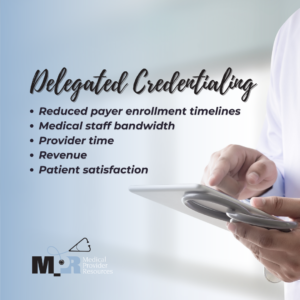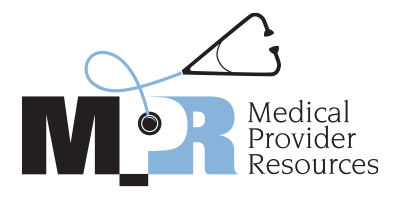What is Delegated Credentialing?
Delegated credentialing is an arrangement in which a healthcare entity authorizes another healthcare entity to credential its healthcare providers. An example: A preferred provider organization (PPO) or other network delegates the provider credentialing process to a hospital. Beyond primary source verification, the delegated facility (the facility with the primary source verified file) is responsible for reviewing provider’s qualifications and executing credentialing decisions on behalf of the delegating facility. With a delegated agreement with the delegated facility, the other entity/facility can accept the primary source verified file and hence bypass having to perform the primary source verification on their own.
 The spectrum of specific data required to make credentialing decisions can include items that MPR is already providing in our primary source verified file to the facility:
The spectrum of specific data required to make credentialing decisions can include items that MPR is already providing in our primary source verified file to the facility:
- State licensure
- DEA Registration
- CDS Certification
- Board Certification/Specialty Information
- Education and Training
- Malpractice History
- Professional Liability Claims Settlement History
- Work History
- Hospital/Facility Affiliations
- Medicare and Medicaid Sanctions
Benefits of Delegated Credentialing
There are five strategic benefits associated with leveraging an internal or external CVO to manage and centralize the provider credentialing process:
- Reduced Payor Enrollment Timelines. Delegated credentialing agreements can greatly reduce the time it takes to successfully enroll a provider with an insurance carrier or other network. Without delegated credentialing, it can take payors up to 120-160 days to credential a provider. Obtaining delegated credentialing agreements with payors can reduce this timeframe to 30-45 days.
- Medical Staff Bandwidth. Providers performing health procedures at several facilities within an
organization carry an additional credentialing burden – each facility must verify the same credentials. Centralizing the process can help optimize the process and give the medical staff more time to attend to other responsibilities – including privileging and individual board approvals. - Provider Time. In a normal scenario, providers working across separate facilities would need to individually complete credential verification paperwork for each facility. Centralizing the process saves providers a lot of time and reduces energy expenditure redundancies.
- Revenue. Reducing the overall amount of paperwork providers are responsible for frees them up to see more patients. Increased patient encounter volume directly correlates with organizational revenue and, ultimately, reimbursements.
- Patient Satisfaction. The initial credentialing process can take a great deal of time. Centralizing operations through delegated credentialing helps support faster onboarding for providers.
How MPR Can Help
While MPR can not enter into a delegated credentialing agreement as a CVO, we are able to help facilities and entities that wish to use the primary source verified file for a delegated agreement. Our primary source verified file can serve as the necessary documentation required of such an agreement. Find out more about our provider credentialing and insurance enrollment services!
Summary
Delegated credentialing agreements can get your providers enrolled in the insurance and health plans faster. The demand for healthcare services is growing, and delegated credentialing can pay significant dividends in both time and money for healthcare facilities/entities looking to keep pace with industry growth. To make this happen, the facility/entity/hospital must have a delegated agreement with each insurance or health plan. The MPR primary source verified file can be used to meet the requirements of the agreement.



